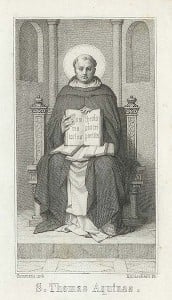 We’re blogging through St. Thomas Aquinas’ Compendium Theologiae, sometimes called his Shorter Summa. Find the previous posts here.
We’re blogging through St. Thomas Aquinas’ Compendium Theologiae, sometimes called his Shorter Summa. Find the previous posts here.
Today’s post is from Chapter 63, “Personal Acts and Personal Properties.”
In this chapter, Thomas continues working out how the standard metaphysical concepts apply in the context of the Trinity.
For Thomas, how a thing acts follows from what it is. Separated from the tree, apples ripen, become mellow, and ultimately rot (if they aren’t eaten). This is what apples do, because they are apples. If you separate a piece of twig from the tree and live it lying around it won’t ripen, and depending on its surroundings it might not even rot. Twigs aren’t the kind of thing that ripen. Now, note that in each case there’s an ordering: the nature of the thing comes first, and the action follows from it. Hold on to that thought for a moment.
Thomas reminds us that the Divine Persons are the personal properties or subsistent relations within the Godhead. And with regard to the Divine Persons, he wants to know the ordering between the Divine Nature and the acts of each of the Persons:
We can perceive from this discussion the nature of the order between the personal acts and the personal properties. The personal properties are subsistent persons.
A person, for Thomas, is a being with intellect and will: a being that understands and acts according to its understanding. Men and women act as they do because they are human: like apples, they act according to their nature. And so it is with the Divine Persons. The Son acts according to His nature. But His nature is shared with the Father and the Spirit; they all share a single divine nature.
And indeed, the Persons act out of that common nature. And their primary acts are the generation of the Son and the procession of the Spirit.
But a person subsisting in any nature whatsoever, acts in virtue of his nature when he communicates his nature; for the form of a species is the principle for generating a product that is of like species.
It is a commonplace of Thomistic metaphysics that effects always resemble causes in some way. When the burning match lights the candle wick, the effect (a flaming wick) resembles the causes (a flaming match). Even when I strike the match to start it burning, I’m starting with a thing that has the power to burn.
And it is the same with God: when God acts, He produces something like Himself.
Consequently, since personal acts in God have to do with communicating the divine nature, a subsisting person must communicate the common nature in virtue of the nature itself.
So far so good. Thomas draws two conclusions from this. First, when the Father generates the Son, He acts in according to His nature, and produces something like Him: the Son.
Two conclusions follow from this. The first is, that the generative power of the Father is the divine nature itself; for the power of performing any action is the principle in virtue of which a thing acts.
Second, we can look at it both ways. As a person, the Father generates out of His divine nature, and does so because He is the Father, and it is His nature to generate. But on the other hand the Son is coeternal with the Father, being (as the Creed says); and so it is equally true to say that the Father is the Father because He generates the Son:
The second conclusion is that, according to our way of conceiving, the personal act of generation presupposes both the divine nature and the personal property of the Father, which is the very hypostasis of the Father. This is true even though such property, regarded as a relation, follows from the act. Thus, in speaking of the Father, if we attend to the fact that He is a subsistent person, we can say that He generates because He is the Father. But if we are thinking of what pertains to relationship, it seems we should say, contrariwise, that He is the Father because He generates.
____
photo credit: Public Domain; source Wikimedia Commons








